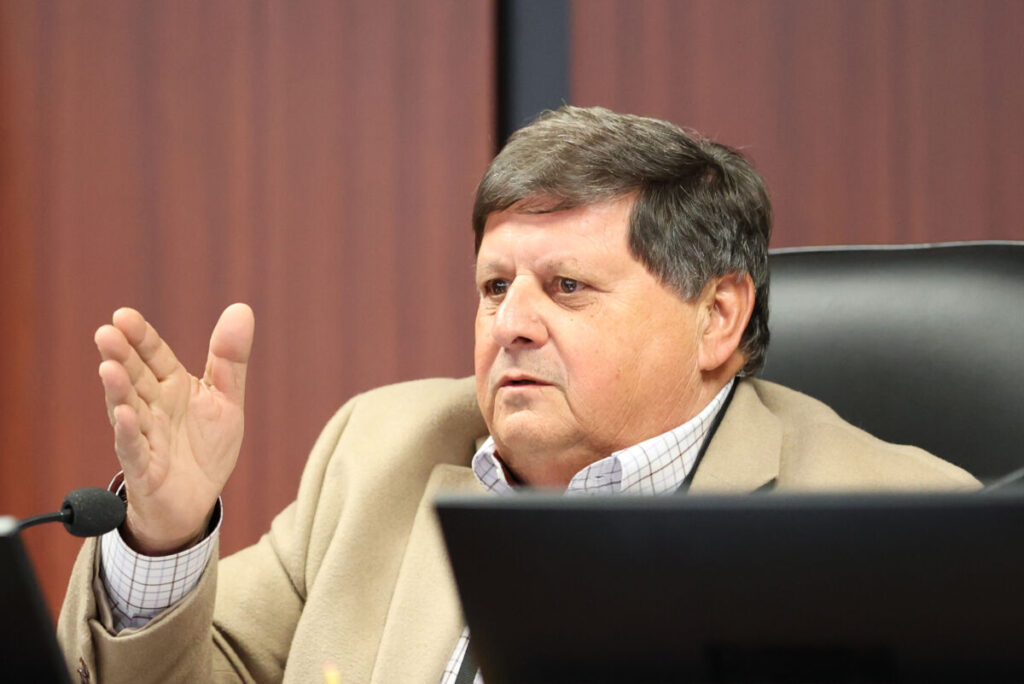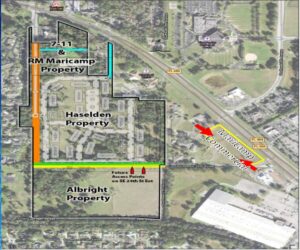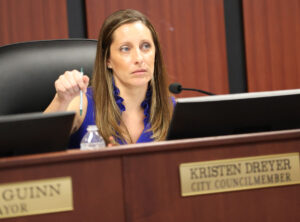Kudos to council for asking questions

Jim Hilty of the Ocala City Council speaks during the Ocala City Council meeting at Ocala City Hall in Ocala, Fla. on Tuesday, Jan. 4, 2022. [Bruce Ackerman/Ocala Gazette] 2022.
At the city council meeting on Jan. 4, an agreement between the City of Ocala and the Albright Trust for a 320-apartment complex off Maricamp was up for approval after two public hearings.
We are not sure if the trust intends to develop the property, or if it wants to sell the property with assurances from the city of a certain number of trips for a future developer. But either way, nearly the entire meeting was focused on how the proposed development provided a challenge to the city to safely accommodate its application while also factoring in future developments nearby that will add even more traffic.
Trip generation in traffic studies is the process of estimating the amount of traffic a proposed development will have once it is built and operating.

This map was shown to the council during the meeting.
It outlines the 4 projects in the same vicinity under review for future development.
1. Albright Trust proposes a maximum 320 dwelling units
2. Haselden Property proposes 312 dwelling units
3. 7-11 & RM Maricamp, LLC proposes a convenience store and office uses
4. ARC of Marion, Inc. 5-lot commercial subdivision
In support of the development agreement between the city and the trust, a study was performed to see how the apartment complex would impact Maricamp’s traffic. According to the mathematical projection of the study- the traffic from a 320-unit apartment complex would be less trips than the trust’s previous request to develop the property at 180 single-family home.
While you ponder the logic of that math, there were also concerns about how neighboring developments would grant easements between themselves so that traffic could flow safely.
Councilman Jim Hilty gave pointed observations about traffic not flowing well and the number of accidents reported on that road as his concern for questioning the development agreement. Specifically, there were concerns of only right-hand hand turns in and out of the development which would require more people making U-turns on the road.
Councilwoman Kristen Dreyer asked questions about how the easements would work, and the viability of getting consensus between all the parties to the easements.
To further complicate the decision before the council, the attorneys for the city and the trust both said there were other necessary changes to the agreement (but of no consequence to the council), and both recommended the council could still approve the agreement for the time being and the details worked out later.
The council received encouragement from the city attorney, Pat Gilligan, city staff from growth management, and the Mayor to approve the agreement.
Under the city’s charter, Ocala’s Mayor Kent Guinn does not have a vote in matters such as these. Yet, he served as a council member prior to becoming the Mayor and so he directed advice in response to Dreyer’s concerns directly by reminding of her of his position “some 22 years ago” when the city approved multiple developments on 200 at the same time. “You will, as this Council, as the Shores develops, and all these other properties develop along Maricamp, you’re going to have the same problem. But you know, I will say that engineers and attorneys have a way of coming to agreements and working all these things out, along with the city. Will it be the best? Maybe not. But it will get worked out,” said Guinn.
Guinn concluded in his advice to council member Dreyer, “I would move forward with this and let the developers and engineers and attorneys work all this stuff out.”
To the council’s credit, they agreed to push off the decision so that more details could be gleaned.

Kristen Dreyer of the Ocala City Council speaks during the Ocala City Council meeting at Ocala City Hall in Ocala, Fla. on Tuesday, Jan. 4, 2022. [Bruce Ackerman/Ocala Gazette]
Addressing the many different nearby developments, Albright said “These properties, and I have to say this because we’re all lumped on- everybody is in the pool together. We’ve got ARC, Fluid Routing Systems, our property, Hazleton, and the Rudianyianis. It’s like squeezing a balloon in the middle- something to go one direction or the other. It’s already gone out 200. It’s bouncing back 17th St. That whole area of southeast section of Ocala is under assault right now. This is an opportunity for this board to watch what happens and use your discretion to make some very tough decisions and do it right.”
Albright then expounded upon all the buffers to neighbors and easements they had offered, and then turned back to cast blame on how the city let nearby Wawa develop, “Now the city didn’t have much of an issue when they asked Wawa to come in. They granted Wawa connection permit to 24th St, never notified the county. Wawa single-handedly destroyed 24th St. I have the videos. I have all of the pictures. They’ve never spent one dime, sent any flowers, any cards or anything. [saying] ‘What can we do to help for 24th St? We’ve destroyed it. How how can we help repair it?’ [Wawa] never did it,” said Albright.
Albright also pointed to the other commercial development recently approved nearby on land owned by ARC of Marion, “This board approved a commercial development for ARC of 24th St on a right in right out with 57,000 square feet of commercial, which was going to be multiple restaurants.”
Albright’s entire plea would be too long to quote, however, the dialog was telling of the dilemmas our elected officials face as we add more people to our roads.
To the city council’s credit, they did not agree that night to enter into the development agreement in order to allow themselves more time to investigate the details. The city council is our last line of defense for blocking development plans that don’t seem logical on their face, and their deliberate and pointed questions are a welcome move as Ocala, and Marion County as a whole, faces unprecedented growth.
A growing city brings added services, value, interest, and jobs to an area. But it also brings with it traffic, increased use of public and private services, and a strain on any infrastructure not fully developed enough to handle the influx.
We appreciate the city council’s calculated and meticulous questions on the issue. To be clear, we are not anti-development by any means. Instead, we consider ourselves pro-Ocala, and pro-process. And in this case, the process should entail ensuring Maricamp, Ocala, and Marion County grow at a level that doesn’t outpace the infrastructure in place.





